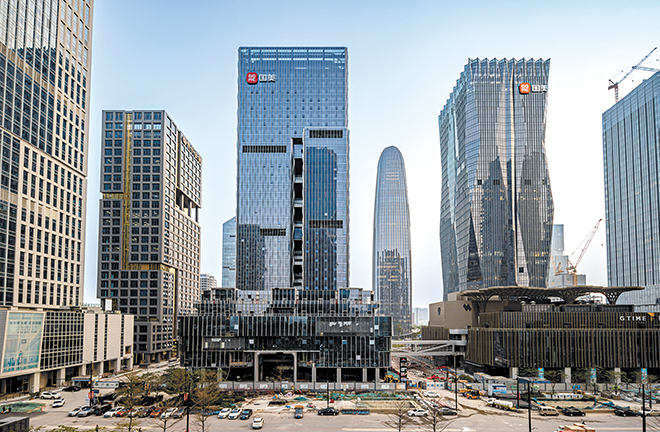Institutional opening-up at the core of high-standard opening-up

The Pazhou Lab,Guangzhou Province Photo: CFP
Confronted with profound and complex changes in the domestic and international environments, institutional opening-up has become the core task of promoting high-standard opening-up in China. Rule alignment, regulatory coordination, management improvement, and standard formulation are currently important measures to accelerate the institutional opening-up.
Alignment with international rules
The object of rule alignment has begun to shift from traditional economic and trade rules to a new generation of high-standard economic and trade rules.
Traditional international economic and trade rules focus on the flow of goods and factors of production, while institutional opening-up focuses on building a fair competitive market and business environment.
The transformation of international production models has put forward new requirements for international trade and investment rules, and the deep division of labor in global value chains will inevitably shift its requirements for opening-up from “border” to “behind-the-border.”
In terms of rule alignment, China can contribute in the following two respects. First, it can focus on promoting the reform of the World Trade Organization (WTO) and the signing and upgrading of regional trade agreements while actively participating in and leading the construction of new rules for international trade and economic cooperation. Second, an institutional opening-up highland should be created and the role of pilot free trade zones (FTZs) fully leveraged.
Regulatory coordination
The focus of regulatory coordination is to accelerate the alignment of domestic regulations with international standards and promote deep domestic market-oriented reform. In recent years, international economic and trade rules have been following the trend of global industrial development and the international division of labor, evolving along the path of high standardization.
High-standard economic and trade rules represented by Comprehensive and Progressive Agreement for Trans-Pacific Partnership (CPTPP) have continually emerged, and the overall trend has continued to expand and extend to “domestic openness” characterized by intellectual property rights protection.
Institutional opening-up not only requires the extension of high-standard international rule systems to the domestic market, it also requires the transformation of domestic institutionalized regulations into internationally accepted rules and standards, thereby breaking the “barriers” between international and domestic economic systems and achieving coordination and integration of the two.
First-class business environment
The main task of management improvement is to create a first-class business environment. The domestic business environment is a key factor for “domestic opening-up.” The geographical layout of global production networks and the transnational concentration of production and business activities largely depend on the friendliness of the business environment in different countries or regions.
In order to comply with and lead the new round of high-standard opening-up, China must strive to create a first-class international business environment, referring to the new round of business environment evaluation index systems of the World Bank Group, and based on China’s actual situation.
The Foreign Investment Law of the People’s Republic of China should be implemented with high quality. Foreign-funded enterprises and private enterprises should be fairly treated.
Benchmarking against the international advanced level, we should further promote and continuously improve the “single window” system for international trade, and gradually extend it to fully cover the entire process of international trade.
Global standards
In recent years, China has steadily accelerated the pace of the “going global” of its standards. In 2022, the “High-Speed Railway Design Infrastructure” standard jointly prepared by more than 10 countries, including China, Germany, Japan, and France, was released and implemented by the International Union of Railways, which is the first international standard in the field of high-speed railway infrastructure design.
As a landmark project between China and Indonesia under the Belt and Road Initiative, the Jakarta-Bandung High-Speed Railway is the first case of an entire Chinese high-speed railway system being exported to a foreign country.
The entire line is of custom design and is produced according to Chinese standards. The internal requirement of standard setting is to improve its own institutional supply.
In terms of standards, the “going global” requires consolidating China’s current industrial foundation, making efforts in key areas, continuing to accelerate the “going global” of China’s high-speed railway standards, focusing on the development of new industrial forms and new models of standards, and comprehensively promoting the “going global” of Chinese standards.
In the process of adjusting and improving global economic and trade rules, presenting China’s voice, proposing China’s plans, and making China’s contributions have become the core of China’s participation in the restructuring of international economic and trade rules.
Wang Ying is a research fellow from the Academy of China Open Economy Studies at the University of International Business and Economics.
Edited by ZHAO YUAN
